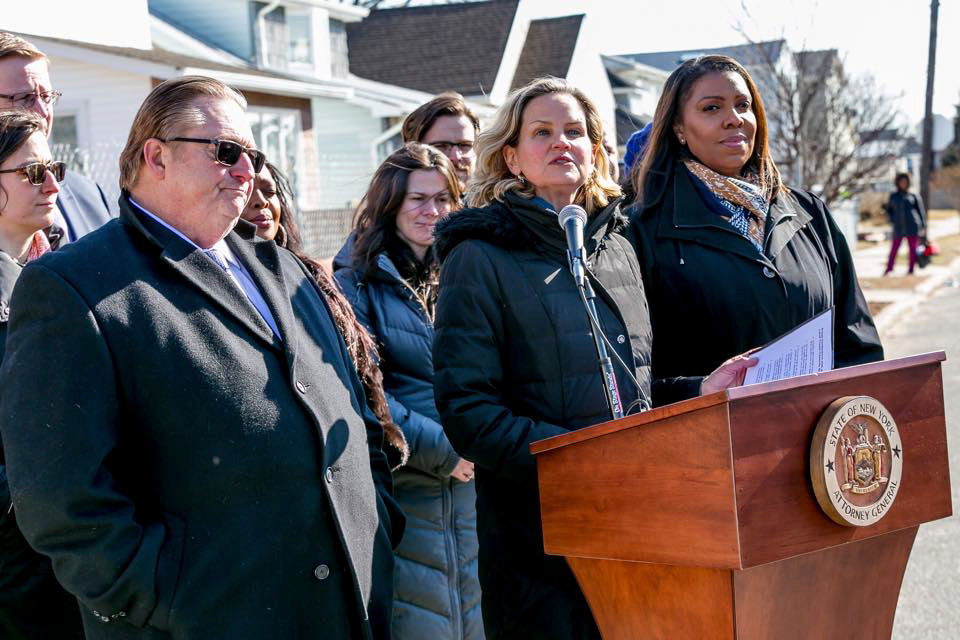Island Park, county officials seek to eliminate zombie homes
Attorney general announces funding for affordable housing
Standing in front of a home in Island Park on Feb. 26, State Attorney General Letitia James announced $8 million in new funding that is available to create and expand below-market housing for first-time buyers in eight New York counties, including Nassau. In Island Park, similar funds have been used to rebuild zombie homes in an ongoing effort by village officials to combat the issue.
Flanked by Island Park Mayor Michael McGinty and Nassau County Executive Laura Curran outside a home on Radcliffe Road in Island Park, James announced that the Community Land Trusts Capacity Building Initiative will enable municipalities and counties to make affordable housing available to buyers who make less than 80 percent of an area’s median income. They will do so through nonprofit Community Land Trusts, or CLTs, which were used to help build the home on Radcliffe Road.
“While the financial crisis may be behind us, we continue to feel and see the effects of the housing crash each and every day,” James said at the news conference. “There are some programs and resources that fulfill the need for affordable housing temporarily, but we don’t need temporary solutions for a long-term problem. . . . It’s really critically important that we create real and permanent solutions that allow New Yorkers to have the stable economic housing that they deserve.”
James added that affordable housing should be a right, not a privilege. She launched the Request for Applications for potential homeowners alongside Curran and McGinty.
McGinty told the Herald that the home on Radcliffe Road was substantially damaged during Sandy and that the Long Island Housing Partnership, based in Hauppauge, purchased the house and two others in the village through the New York State Housing Trust. Peter Elkowitz serves as the president and CEO of the LIHP, a nonprofit community land trust that has been in business for three decades. The LIHP demolished the homes, and will build three new single-family homes, including the one on Radcliffe, to sell them to new owners. They will be selected from a federally approved lottery of 120 potential buyers from across Nassau and Suffolk counties, as well as Queens.
Citing an ongoing effort to revitalize zombie homes, McGinty said that village officials expedited the building and zoning permits and other obstacles so that the homes could be rebuilt as quickly as possible.
He said the efforts have helped in combating the number of zombie homes in Island Park. “If there is one zombie home in the village, it’s a problem,” he said. “We have a few, and we are working our way through a very long process.”
McGinty added that it’s a win-win to create affordable housing while also rebuilding abandoned homes as village officials look to decrease the number of zombie homes in Island Park. “For Long Island Housing Partnership, it creates affordable housing,” he said. “From the village’s viewpoint, it’s reducing blighted property, reducing substantially damaged, unoccupied homes and increasing the property tax roll.”
The home on Radcliffe Road cost about $400,000 to build, and will be offered for about $230,000 to an eligible buyer. The nonprofit owns the land under the home and leases it to the buyer.
Curran said that quality, affordable housing and local homeownership are the backbones of a stable community, and that many are still dealing with the impact of the housing crisis and damage wrought by Sandy.
“Bringing vacant and abandoned homes, zombie homes, back to life to create permanent affordable housing is a top priority for us here in Nassau,” she said.
The initiative began in 2017 and is in its second round of grant making. The program received a boost of $4.5 million over its first year, when $3.5 million in grants were distributed. The awards go to the CLTs to fund startup costs, acquire and renovate distressed properties, and provide training and technical assistance to homeowners. In its first round, the initiative secured grants for 12 properties in Nassau and 11 in Suffolk.
Funding applications are due on April 1, and awards should be announced in mid-May, according to the attorney general’s office.
McGinty said that eliminating zombie homes is a priority. “The board and I keep pushing,” he said. “We keep trying to move this village forward. Every time we make progress, we’re happy, we’re excited, and it gives us the impetus to continue.”

 41.0°,
Fair
41.0°,
Fair 





